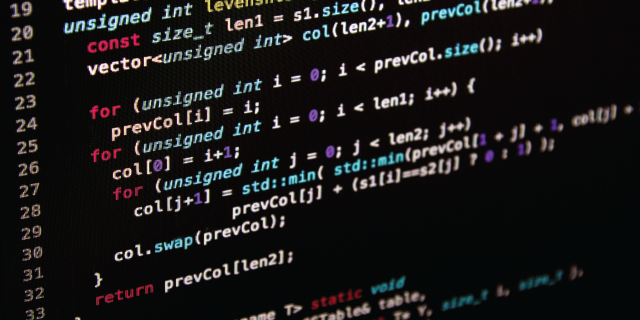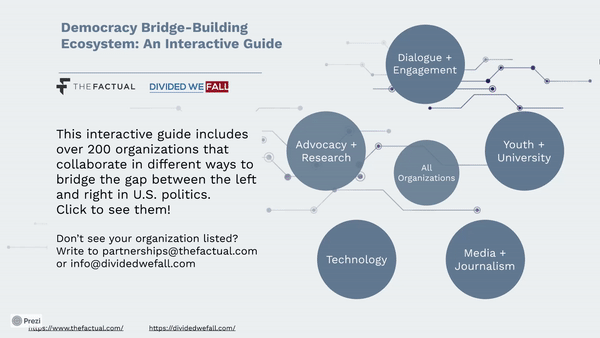What happens when a conservative and a liberal decide to jump in an old Volvo and drive nearly 20,000 miles through 44 states across the U.S.? That’s the question at the heart of a new book, Union: A Democrat, a Republican, and a Search for Common Ground, by Jordan Blashek and Christopher Haugh.
Chris and Jordan’s search for common ground despite their political differences is a mission that aligns well with The Factual. So I was delighted to sit down with them a few weeks ago to see if their road trip revealed insights that may be useful to all of us grappling with an increasingly polarized society. Here are five excerpts from our fascinating conversation:

You had many arguments on the road. Did you ever feel like throwing in the towel and saying this road trip was a bad idea?
Jordan: I’m pretty sure Chris feels that way every time we have these arguments! I’m the combative one and love instigating our arguments. We have definitely had these moments. But over time we learned where our limits are and were respectful of them.
Chris: We were lucky that our first argument was in a car, hundreds of miles away from the closest town. When you’re in the midst of one of those fights and suddenly one person says “I’m done,” he can’t really get out of the car. Something about being forced together taught us this lesson of coming back to the table and how important that is.
We were forced to go through this thought process of: “Oh my God, I can’t believe I’m here. I can’t believe I’m with him. I can’t believe he said that.” Then you start to think, “well, maybe I shouldn’t have said that one thing. And maybe he had a point about that one thing.” You start to go through a full-circle process. And that first fight ended with “I love you, man. I’m still angry and we haven’t resolved this. But I’m committed to this project and friendship.”
At the end of this trip, Chris said “I’m still a Democrat” and Jordan said “I’m still a Republican.” So what changed for you two on this trip?
Jordan: For both of us two things have changed. One is personal to ourselves and the other is our views of the country.
When we started out on this trip I was the optimist. I was sure that wherever we went we’d find signs that America was strong, healthy, and vibrant. That the American people were good. And that it would be evident everywhere.
And Chris was more of a skeptic based on what he was hearing in the news and the data about various parts of American life. There would be signs of America coming apart and there would be signs of decay.
Over the course of three road trips, it changed both our views. In the end, Chris saw a lot of what led to my optimism and it made him view the country differently and I also saw a lot of the structural problems that Chris was worried about and it tempered my optimism.
On an individual level, having these individual conversations and fights and figuring out how our friendship can navigate that made us deeper people. We developed more empathy for the other side. We found blind spots in our own views and politics. And though we didn’t switch parties or change our beliefs it made our beliefs more rigorous and gave us the ability to see the world through other people’s eyes.
Chris: I like to say that Jordan has made me a better liberal, and I think Jordan says the same about my impact on his conservatism.
Sometimes we don’t muster all the right evidence or are not aware of our blind spots, and our friends who think the same way we do are incapable of pointing them out. [When you engage with someone who has different beliefs] you’re able to refresh your arguments, have these moments of crisis, and come back stronger. Sometimes that means moderation, sometimes it means we become more radical. But hopefully, we become better citizens as a result.
A lot of your book is about a very diverse and memorable set of people you met on the road. For both of you, who was the most impactful person you met?
Chris: Someone who’s a friend of mine these days is Pete Mylen. He’s a trucker from Daytona Beach, Florida who’s been on the road for 40 years. When we met him he had a Make America Great Again shirt, but we quickly realized he’s far more complex than that shirt might indicate.
The first time we brought up politics Pete said, “You know, I support the president but I really wish he’d talk more about climate change.” This coming from a guy driving a diesel truck at 80 miles an hour!
He went from there to talk about his faith, his support for LGBTQ marriage — all these policy ideas and values that I wouldn’t have necessarily associated with someone who wore a MAGA shirt four out of the five days we were with him. He really taught us how hard it is to look at someone and say “I know who that person is.” If you don’t actually talk to them, if you don’t actually engage with them, you don’t get to know what they actually think because oftentimes it’s easy to ascribe values to someone without looking more deeply into them.
Jordan: For me, it was this man Gabriel, who was in Parnall prison. After our time with Pete, we did another road trip where we wanted to explore this idea of redemption. We believe that America is built on this idea of second chances, it’s a uniquely American value that pervades our ethos. And yet we had heard that the criminal justice system is a place where this might be out of sync with our ideal.
So in Detroit, we met this Shakespeare ensemble of 30 men from prison who were performing King Lear, and we were going to have a discussion on redemption afterward. And this one guy, Gabriel, is just throwing himself into the play, acting with all his energy. He’s interpreting everything with so much depth that Chris and I were in awe of his talent and his drive to better himself. Afterward, he talked about what it means to take personal responsibility and the a-ha moment that it takes to do something better with your life. He’s on my mind now because Parnall prison has been hit pretty hard by Covid and it’s a reminder that these men are in a really hard situation and are suffering. But I’m also thinking about the amount of talent and will Gabriel has, but knowing the barriers he’s going to face . . . really tugs at my heart.
My favorite line in the book is “we are at our worst when we speak for a flag or a group.” Can you expand on that?
 Chris: This was a phenomenon we found over and over again. When we argue on behalf of people we had never met or groups whose policies we don’t always agree with, like the Democratic or Republican party, or a media organization like The Times, we were at our worst. Because we felt we had to be these two-dimensional figures because we had to defend these groups that we didn’t know all that well. And you’re searching for the talking points and trying to win because it’s almost like you have this symbol or value that represents good and the other person represents bad.
Chris: This was a phenomenon we found over and over again. When we argue on behalf of people we had never met or groups whose policies we don’t always agree with, like the Democratic or Republican party, or a media organization like The Times, we were at our worst. Because we felt we had to be these two-dimensional figures because we had to defend these groups that we didn’t know all that well. And you’re searching for the talking points and trying to win because it’s almost like you have this symbol or value that represents good and the other person represents bad.
But when we were able to get away from that, when we were able to speak as other identities, just Jordan and Chris, conversations were about getting to the bottom of things.
Jordan: I think it’s very unproductive when we’re speaking on behalf of our parties and defending things that might not necessarily align fully with our own beliefs. I think there’s a counterpart to it which is another way of engaging is through loyalty tests — “do you agree with x?” And if I say no then all of a sudden I’m not on your side anymore. It’s all about figuring out which tribe are you part of. Chris and I found that whenever we engaged in a way that seemed to say “if you disagree with me then you’re in that box and that box has bad things associated with it,” it led to more defensive arguments because now a bad association is leveled on me.
In the last few years I’ve had to face this question of “Do you support Donald Trump?” And the implication is that if you do then you’re a bad person. But it doesn’t get to the nuance that there are some things he does that I agree with, some things he does that I don’t agree with, and some things I probably hate. But putting it as a binary context puts me into a bind. So over time we moved away from thinking like that.
Do you think we talk about politics too much as a society?
Jordan: Yes, absolutely. Politics has become everything. As Chris and I found, outside the glare of the cameras and political rhetoric the people we met were good people. We were able to connect at this very human level. Politics is all about line drawing. If you’re on this side of the line, you’re on my team. If you’re on that side of the line, you’re my enemy. So the fact that politics has invaded every aspect of life today, it’s not healthy. It’s what drives our intense polarization. It’s making us angrier and testier and doesn’t allow for the cultivation of friendship, grace, love, compassion, empathy.




